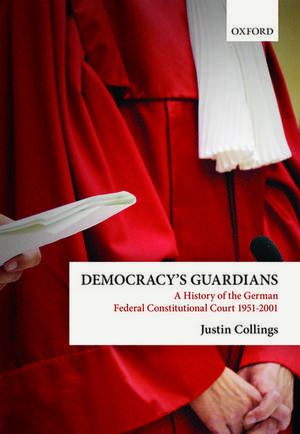Democracy's Guardians: A History of the German Federal Constitutional Court, 1951-2001
Autor Justin Collingsen Limba Engleză Hardback – 17 sep 2015
Preț: 750.69 lei
Preț vechi: 1031.75 lei
-27% Nou
Puncte Express: 1126
Preț estimativ în valută:
143.64€ • 149.99$ • 118.62£
143.64€ • 149.99$ • 118.62£
Carte tipărită la comandă
Livrare economică 04-10 aprilie
Preluare comenzi: 021 569.72.76
Specificații
ISBN-13: 9780198753377
ISBN-10: 0198753373
Pagini: 374
Dimensiuni: 183 x 249 x 28 mm
Greutate: 0.86 kg
Editura: OUP OXFORD
Colecția OUP Oxford
Locul publicării:Oxford, United Kingdom
ISBN-10: 0198753373
Pagini: 374
Dimensiuni: 183 x 249 x 28 mm
Greutate: 0.86 kg
Editura: OUP OXFORD
Colecția OUP Oxford
Locul publicării:Oxford, United Kingdom
Recenzii
This book is written in a well-crafted academic prose, full of interesting detail and insightful historical observations, complete with miniature portraits of the dramatis personae. The depth and breadth of Collings's understanding of modern German history are admirable.
This volume constitutes a fundamental work in the constitutional history of modern Germany and is of obvious interest, not only to legal historians but to all who are interested in the political and social history of postwar Germany. There thus emerges from the pages of the book the portrait of an entire epoch of German history, the principal lines of which have been drawn from the decisions of the Court, which from its inception has guided and defined the democratic growth of the country.
This volume constitutes a fundamental work in the constitutional history of modern Germany and is of obvious interest, not only to legal historians but to all who are interested in the political and social history of postwar Germany. There thus emerges from the pages of the book the portrait of an entire epoch of German history, the principal lines of which have been drawn from the decisions of the Court, which from its inception has guided and defined the democratic growth of the country.
Notă biografică
Justin Collings is Associate Professor of Law at the J. Reuben Clark Law School at Brigham Young University, where he teaches comparative constitutional law, legal history, and torts. He is a graduate of Yale Law School and holds a Ph.D. in modern European history from Yale University. In 2012-2013 he was law clerk to the Honourable Guido Calabresi of the United States Court of Appeals for the Second Circuit.












